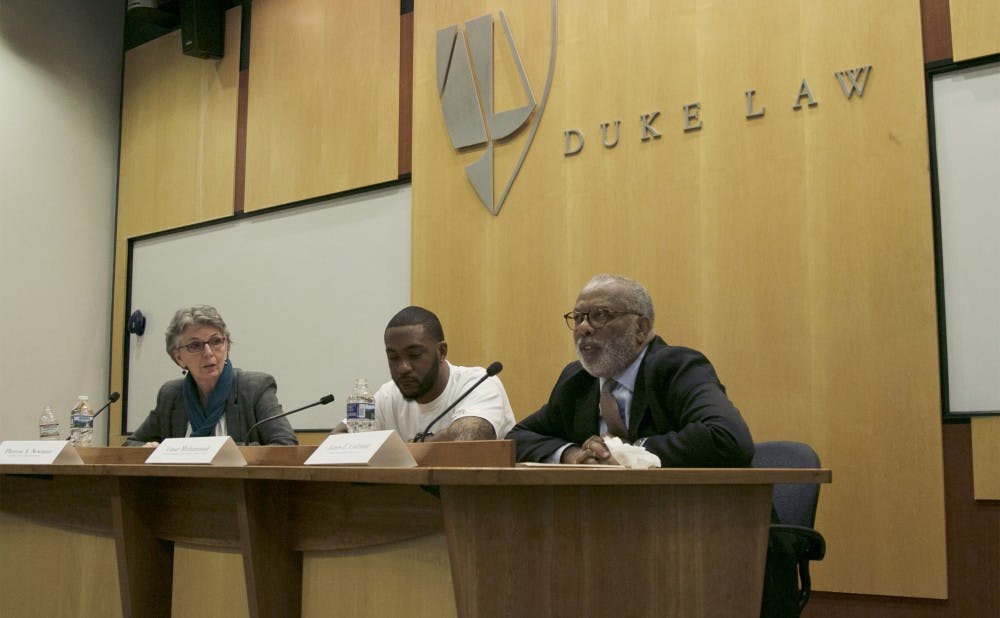The Duke Journal of Gender Law and Policy hosted a symposium Tuesday focusing on efforts to improve criminal justice and the American prison system.
Titled “Intersectionality and the Black Lives Matter Movement,” the event featured a panel of speakers, including James Coleman, John S. Bradway professor of the practice of law, and Umar Muhammad, community organizer for the Southern Coalition for Justice, along with Theresa Newman, clinical professor of law. Coleman and Newman, who are co-directors of Duke's Wrongful Conviction Clinic, related their clinical work to Muhammad's history with the prison system during their discussion.
“This is my lived experience,” Muhammad said. “I’m formerly incarcerated, I spent a lot of my childhood in different systems and I had no idea about the beast that communities of color are fighting. My mother didn't know about the school-to-prison pipeline, she just knew she had a black boy.”
Coleman explained how his work with wrongfully-convicted clients had shaped his view of the U.S. criminal justice system, which he described as racially lopsided.
“It’s not by choice that most of my clients are African American," Coleman said. "It’s a fact of life and of the prison system. If most of the people going into the system are black men, most of my clients will be too.”
Coleman added that he perceives the Black Lives Matter movement's name to be posing a question rather than making an emphatic statement.
“I don’t believe you can look at what is happening to black men in prison and think that anyone really cares about them,” he said. "As a result of the largely inconsistent prison conditions across the nation and the lack of true rehabilitation in most cases, there is an innate sense of urgency in the approach to these problems."
The panelists agreed that in their opinions, the criminal justice system is defined by a general aura of indifference.
Muhammad noted that during his five-year prison sentence, he completed multiple classes, earned certificates in his courses and built his resumé. Upon release, however, he was unable to find work because of his criminal background.
“I’m prepared to speak in interviews, but I’m not getting interviews!” Muhammad said. “I didn’t feel prepared for the world. I didn’t feel rehabilitated. I had no resources.”
The discussion later turned to the prospect of higher education as a means for released individuals to strengthen and expand their job opportunities. Panelists noted, however, that past criminal charges can make the college admissions process—even at technical and community colleges—almost impossible for many.
Muhammad emphasized the cyclic nature of the criminal justice system, explaining how released individuals often end up back on the streets engaging in the same behavior for which they were initially prosecuted.
“I honestly believe this [work] is the only thing I could be doing right now," he said. "So, you know, for me, this is my way out."
The Southern Coalition for Justice is a center where former inmates serving felony charges can seek free legal counsel and possibly erase their criminal backgrounds, Muhammad said. He added that these opportunities make it possible for past criminals to get a fresh start with future employers.
Coleman, Muhammad and Newman noted the importance of focusing future efforts on the treatment and rehabilitation of criminals, emphasizing the role of local communities in contributing to such changes.
Looking at national policy, Coleman said he does not believe that President Donald Trump’s election will directly affect the prison system's current condition, both due to the general difficulty of achieving prison reform and Trump's lack of interest in the matter.
The panelists called on audience members to reach out to local leaders and make their voices heard, before trying to bring change at federal level. The problem of the U.S. prison system, they said, can only be solved “one bite at a time.”
“On a local level, Duke impacts our whole city of Durham,” Muhammad said. “I believe that, collectively, the voices in this room can lean on the structures of Duke—banning the box, calling out white supremacy and structural and institutional racism. [Duke] can set the bar for Durham.”
Get The Chronicle straight to your inbox
Signup for our weekly newsletter. Cancel at any time.

